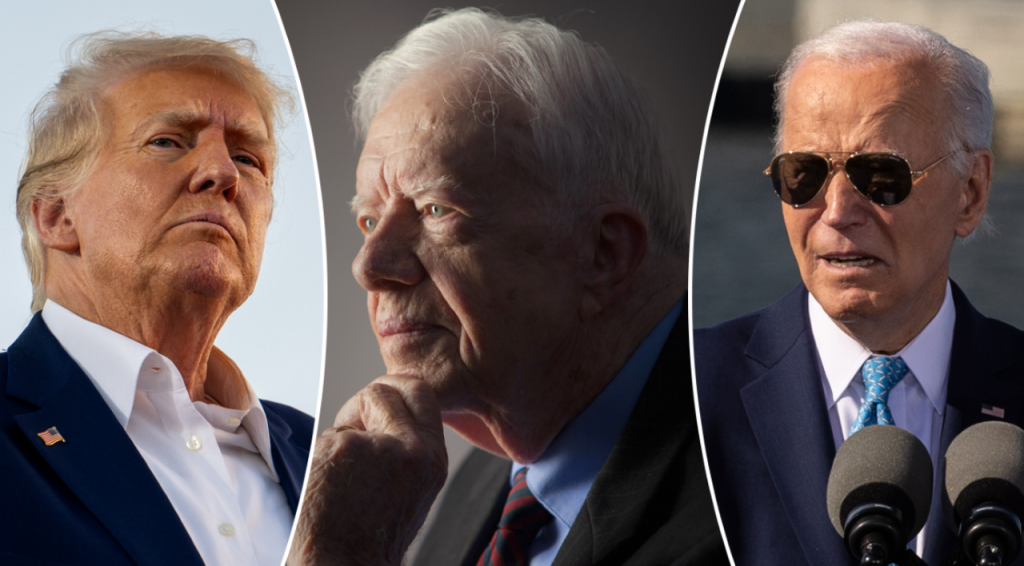A Nation Mourns a Leader of Character: President Biden Honors Jimmy Carter’s Legacy and Implicitly Critiques President-Elect Trump
President Joe Biden delivered a heartfelt tribute to former President Jimmy Carter following his passing at the age of 100. Biden’s voice, thick with emotion, conveyed the deep personal connection he shared with Carter, a man he described as a "dear friend" of over 50 years. The eulogy, delivered on Sunday, painted a portrait of Carter not simply as a former president, but as a paragon of virtue, a man whose life was a testament to "meaning and purpose, principle, faith, and humility." Biden argued that these qualities, often associated with a "bygone era," remain essential and worthy of emulation in contemporary society. He urged Americans to strive to embody the same decency and character that defined Carter’s life, both public and private. The president emphasized that Carter’s legacy was not confined to his time in office but extended to his post-presidency work, including his tireless efforts with Habitat for Humanity, showcasing a lifelong commitment to service and compassion.
Biden’s personal reminiscences offered intimate glimpses into Carter’s character. He recalled a moment from the 1970s, during Carter’s gubernatorial term, when the future president sought Biden’s support for his presidential campaign. Despite Biden’s relative inexperience at the time, Carter recognized his potential and insisted on his involvement, demonstrating a keen eye for talent and a belief in empowering others. Biden underscored that his endorsement of Carter was rooted not just in policy agreement but in admiration for his unwavering integrity and decency. This anecdote served to highlight Carter’s humility and his ability to connect with people from all walks of life, qualities that resonated throughout his career.
In a thinly veiled critique of the incoming president, Donald Trump, a reporter’s question about what Trump could learn from Carter’s legacy elicited a pointed response from Biden: "Decency, decency, decency." This emphatic repetition underscored the contrast between Carter’s compassionate approach and the divisive rhetoric that had characterized Trump’s campaign. Biden posed rhetorical questions, challenging the audience to imagine Carter ignoring those in need or resorting to personal attacks based on appearance or speech. This subtle yet powerful rebuke implicitly criticized Trump’s behavior and suggested that he lacked the fundamental human decency that exemplified Carter’s leadership.
President-elect Trump also released a statement acknowledging Carter’s passing, albeit with a markedly different tone. Trump’s message, posted on Truth Social, highlighted the shared experience of holding the presidency, emphasizing its unique demands and responsibilities. He offered a perfunctory acknowledgment of Carter’s efforts to improve the lives of Americans, expressing a general "debt of gratitude." The statement maintained a formal, detached tone, lacking the personal warmth and genuine emotion that characterized Biden’s remarks.
Trump’s subsequent post further distanced him from Carter’s legacy, admitting to "strong" philosophical and political disagreements. However, he conceded that Carter possessed a genuine love and respect for the United States and worked diligently to improve the nation. This grudging acknowledgment of Carter’s patriotism and efforts suggested an attempt to appear respectful while maintaining a critical distance from his political ideology. The statement concluded with a perfunctory expression of respect and an acknowledgment of Carter’s significance, both during and after his presidency. The overall tone of Trump’s statements, while acknowledging Carter’s contributions, lacked the depth of feeling and personal connection evident in Biden’s tribute.
The contrasting responses to Carter’s death from Biden and Trump underscored a deeper divide in American political discourse. Biden’s eulogy celebrated Carter as a model of ethical leadership, emphasizing his humility, compassion, and commitment to service. This message resonated with those who yearned for a return to civility and decency in politics. Conversely, Trump’s statements, while acknowledging Carter’s service, maintained a distance that reflected his differing political philosophy and personal style. This divergence highlighted the ongoing tension between contrasting visions of leadership and the ongoing debate over the role of character and morality in public life. The passing of Jimmy Carter provided not only an occasion for national mourning but also a stark reminder of the profound differences in values and leadership styles that shape the American political landscape.


